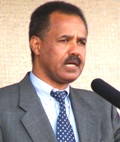Afworki hails ??Eritrean-Kuwaiti relations
 KUWAIT, Oct 4, 2004 (KUNA) — President of Eritrea Isaias Afworki commended the Eritrean-Kuwaiti relations, saying that they are based on historic background dating back 40 years.
KUWAIT, Oct 4, 2004 (KUNA) — President of Eritrea Isaias Afworki commended the Eritrean-Kuwaiti relations, saying that they are based on historic background dating back 40 years.
In a press conference held at Bayan Palace Monday, the president said that ”Kuwait has supported Eritrea’s right to determine own fate at international conventions since the beginning of the armed conflict in 1961 up to its independence in 1990.”
”Kuwait’s support has continued at different levels, including developmental and investment projects,” he continued.
He noted that the aim of his visit is “to consolidate strategic relations and effective cooperation between the two sides so as to create a suitable atmosphere for investment, development and trade between the two countries.”
The Eritrean President went on to say that there are several development and infrastructure projects underway in cooperation with the Kuwait Fund for Arab Economic Development (KFAED) and others still being studied, as well as relations with the Kuwaiti Chamber of Commerce and Industry.
Despite the small size of Eritrea and the poverty it suffers, Afworki said that what has been achieved over the last ten years is greater than any achievement made by other African countries.
”The government is currently seeking to provide the necessary infrastructure to create an attracting atmosphere for investors,” he said.
The number of KFAED loans to Eritrea number four at a total cost of KD 20.8 million, as well a grant of KD 298,000.
In response to a question regarding accusations that Eritrea interferes in the internal affairs of Sudan, Yemen and Ethiopia, and trains and houses insurgents, Afworki said, “These countries must resolve their internal affairs without exporting them abroad.”
He invited the media, as well as neutral and objective bodies to visit Eritrea to see for themselves that it is free from such opposition training camps and Israeli bases, adding that “these camps do not exist and we receive all of this information from the media.”
He described these accusations as “being a figment of the imagination of many,” wondering at the same time whether the aim behind them is “to instigate problems to cover up issues or to cause confusion?”
Regarding Eritrean-Ethiopian relations, the president said that there are tensions due to Ethiopia’s rejection of the final and committing verdict of the court established to resolve the conflict between the two countries, stressing that “the issue have been settled.”
As for Eritrea’s membership in the Arab League, he said that “despite many reservations as to the Arab League, we have reached a compromise in the form of participating as an observing member,” adding that “there is no use in joining the Arab League at a time when many discontent members are leaving it”.
On Iraq, he stressed that “there is no debate over the fact that ousting the former Iraqi regime was the right step for achieving regional stability, but what took place following this action is due to miscalculations and lack of understanding as to the Iraqi nature.”
Afworki said, in his personal opinion “what is important is correcting the mistakes that have taken place and not whether or not the elections are held on time,” adding that “the elections should not be looked at in terms of timing, as it is a matter of transition for the return of stability to Iraq.”
The Eritrean President Isaias Afworki had arrived in Kuwait on Saturday on a four-day visit during which he met with the Representative of His Highness the Amir, His Highness the Prime Minister Sheikh Sabah Al-Ahmad Al-Sabah, as well as the Minister of Energy Sheikh Ahmad Fahd Al-Ahmad Al-Sabah.
He also met with Acting Director-General of KFAED Abdul-Wahab Al-Bader, Board Chairman of the Chamber of Commerce and Industry Ali Thnayan Al-Ghanim and the acting chairman of the parliamentary foreign affairs committee MP Marzouk Al-Hubaini.
